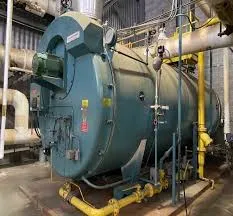
Nov . 12, 2024 05:27 Back to list
heat transfer oil boiler
Understanding Heat Transfer Oil Boilers
Heat transfer oil boilers have gained significant popularity across various industries, primarily due to their efficiency and versatility in providing thermal energy. Unlike traditional steam boilers that use water as a heat transfer medium, heat transfer oil boilers utilize specialized thermal oils, which operate at higher temperatures without the risk of pressure build-up associated with steam.
How Heat Transfer Oil Boilers Work
The basic principle behind heat transfer oil boilers involves heating a thermal fluid within the boiler system. This fluid, often a synthetic oil, has a high boiling point, allowing it to transfer heat efficiently. The heating process involves circulating the thermal oil through a series of heated coils within the boiler. As the oil absorbs heat, it reaches temperatures significantly higher than water, typically ranging from 300°C to 400°C (572°F to 752°F) without transitioning to steam.
Once heated, the thermal oil is circulated through various heat exchangers or process equipment, where it transfers the stored thermal energy to the application — whether for direct heating or for use in industrial processes. This allows industries such as food processing, chemical manufacturing, and plastics production to utilize precise temperature control, enhancing operational efficiency.
Advantages of Heat Transfer Oil Boilers
1. Higher Operating Temperatures Heat transfer oil boilers can achieve much higher temperatures than conventional water boilers. This makes them suitable for high-temperature applications that require precise thermal control.
2. Reduced Pressure Risk Operating under lower pressures significantly reduces the risk of explosions or boiler failures. This feature enhances safety compared to steam boilers, where high pressure can pose significant hazards.
3. Energy Efficiency The thermal oils used are designed to retain heat for extended periods. This characteristic ensures that the energy used in heating is effectively conserved, leading to lower operational costs. Additionally, they can recover excess heat, improving overall system efficiency.
4. Environmental Sustainability With advancements in synthetic oils, heat transfer systems can reduce environmental impact. Many modern thermal fluids are formulated to be less toxic and have lower environmental footprints compared to traditional fossil fuels.
heat transfer oil boiler

5. Versatility Heat transfer oil boilers can be employed in various applications across numerous industries, including food processing, pharmaceuticals, textiles, and more. Their adaptability makes them an integral part of numerous manufacturing processes.
Considerations in Choosing Heat Transfer Oil Boilers
When considering the implementation of a heat transfer oil boiler, companies must evaluate several factors
- Thermal Oil Selection Choosing the correct thermal oil is crucial. The oil must be compatible with the operating temperature, and its chemical properties should align with the process requirements to prevent deterioration over time.
- System Design and Maintenance Proper design and regular maintenance are critical to ensuring the longevity and efficiency of the system. Factors such as pump selection, piping layout, and insulation should be considered during the design phase.
- Safety and Compliance Companies should adhere to local regulations and industry standards. Safety measures, including pressure relief valves and monitoring systems, must be implemented to ensure safe operation.
- Cost Analysis While the initial investment in a heat transfer oil boiler system may be higher than traditional systems, the long-term savings in energy efficiency and reduced maintenance costs can make it a financially viable option.
Conclusion
Heat transfer oil boilers present a reliable and efficient solution for industries that require high-temperature heating without the complexities associated with steam pressure systems. Their design, efficiency, and versatility make them a preferred choice for various applications, ensuring that industries can maintain productivity while prioritizing safety and sustainability. As technology continues to evolve, heat transfer oil boilers will undoubtedly play a pivotal role in the future of industrial heating solutions.
-
High-Efficiency Commercial Oil Fired Steam Boiler for Industry
NewsJul.30,2025
-
High-Efficiency Biomass Fired Thermal Oil Boiler Solutions
NewsJul.30,2025
-
High Efficiency Gas Fired Thermal Oil Boiler for Industrial Heating
NewsJul.29,2025
-
High-Efficiency Gas Fired Hot Water Boiler for Sale – Reliable & Affordable
NewsJul.29,2025
-
High Efficiency Biomass Fired Hot Water Boiler for Industrial and Commercial Use
NewsJul.29,2025
-
High-Efficiency Biomass Fired Hot Water Boiler for Industrial Use
NewsJul.28,2025
Related PRODUCTS






















